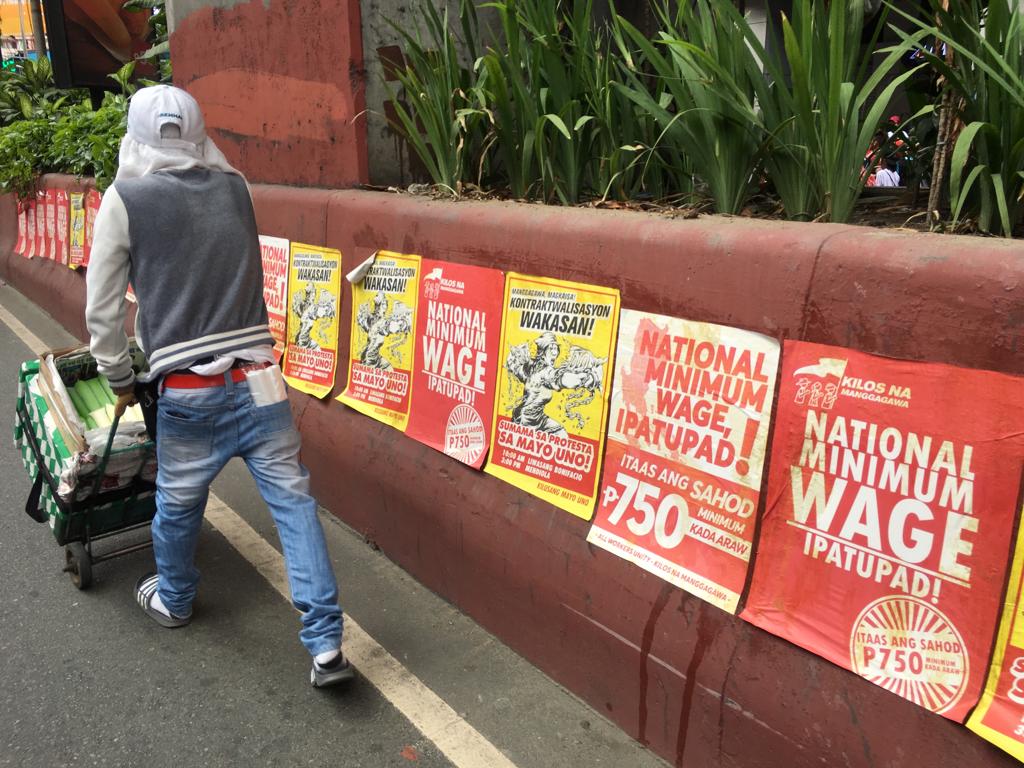
A street vendor walks along an array of posters with workers’ demands for fair wages and an end to contractualization. Manila, Philippines. 1 May 2018. Photo by Joseph Purugganan
By Joseph Purugganan
In his final labor day address to workers, outgoing Philippine President Rodrigo Duterte spoke about celebrating “all the triumphs and progress that the labor movement has accomplished over the years,” but he spoke as well about the need “to overcome the challenges by recognizing the rights of our workers and reassessing the systems that may hinder their growth and development.” [1]
For Filipino workers, one of the central challenges to the realization of workers rights to have and enjoy the benefits of secure and stable employment is contractualization. Commonly referred to as ‘endo’ (end of contract), the illegal practice of hiring fixed-term employees usually for a period of 5 months or less, and continuously renewing their contracts to avoid giving workers the benefits of regular employment, has become an integral part of the employment system in the country.
The estimates put the figure anywhere from 1.2 million [2] to as many as 20 million [3] contractual workers or non-regular workers in 2016. The low end looks at non-regular workers (which include probationary, casual, contractual or project based, seasonal workers, and apprentices/learners) in establishments with 20 or more workers (partly small, and medium to large enterprises) [4]. The higher estimate, on the other hand, looks at contractual work based on overall employment including in micro and small establishments. Contractual work therefore represents around 27-45 percent of total employment in the country.
As Table 1 shows, over 270,000 non-regular workers or 22.7 percent are found in the administrative and services sector, followed by workers in the manufacturing sector where over 269,000 contractual workers are employed, and rounding up the top three is the construction sector employing over 150,000 non-regular workers.
Table 1. Total Employment and number of non-regular workers in establishments with 20 or more workers by category and major industry group, Philippines. June 2016.
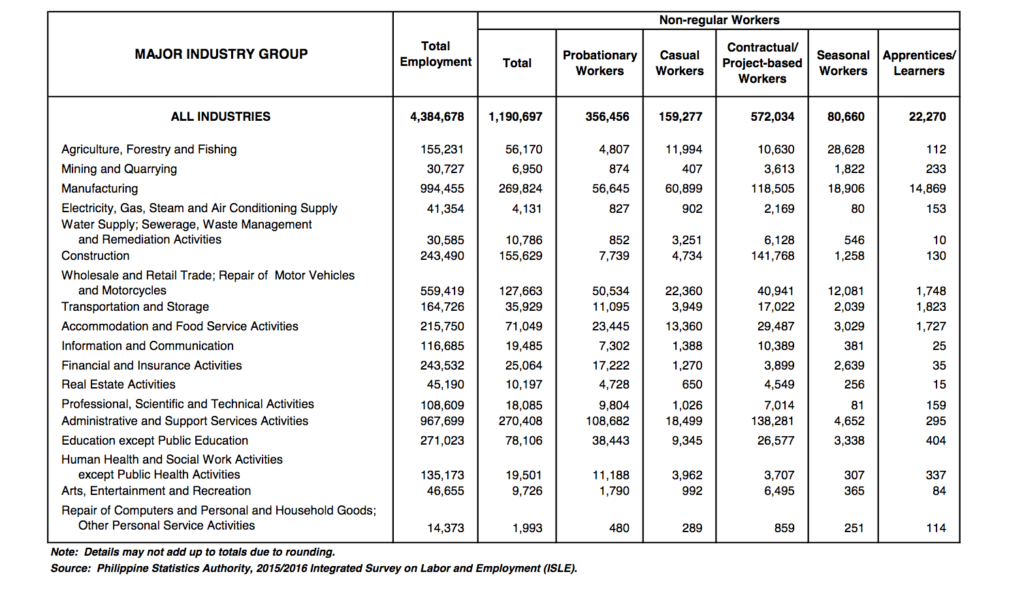
Taken for a Ride
Duterte made a lot of promises on his way to the presidency in 2016. One of these is the promise to end contractualization. By the first year, the Department of Labor and Employment (DOLE) issued a Department Order (DO18-A), which set out the implementing guidelines of Articles 106 to 109 of the Labor Code of the Philippines –the provisions in the law that legalizes the practice of agency hiring, which has been identified and criticized by labor groups as the root cause of contractualization. [5] Subsequently, another Department Order (DO174) was issued by DOLE which was supposed to establish stricter guidelines on contractualization. Like the first DO, labor groups likewise rejected the new order as it allows “legal” forms of contractualization and how it falls short of the promise to end and ban all forms of contractualization. Under DO 174, manpower agencies – not the main employers – are ordered to regularize their workers.
By his second year in office however, Duterte seemed to have abandoned the fight altogether. While signing an Executive Order (EO15) which prohibited illegal contracting or subcontracting, the order added the qualifying proviso, “when undertaken to circumvent the workers right to security of tenure, self organization and collective bargaining, and peaceful concerted activities,” which narrowed the scope of what would be considered illegal practice. Duterte himself admitted that said order “had no teeth” [6] as the order prohibits but does not penalize the practice. According to Duterte, penalizing violators would violate the law. The order was again criticized as it would allow seasonal or project-based jobs such as those for janitors and maintenance workers. Workers also lambasted the order for merely reiterating the current regulatory policy that failed to prevent the spread of contractualization. [7]
In July 2019, Duterte vetoed a Security of Tenure bill passed by Congress. Duterte said he rejected the landmark measure because it “unduly broadens the scope and definition of prohibited labor-only contracting, effectively proscribing forms of contractualization that are not particularly unfavorable to employees involved.” [8] He added that “sweeping expansion of the definition of labor-only contracting destroys the delicate balance and will place capital and management at an impossibly difficult predicament with adverse consequences to the Filipino workers in the long term.” [9]
Progressive labor groups also rejected the Security of Tenure Law passed by Congress based on the bill passed in the Senate, on the grounds that “watered-down version failed to address two fundamental demands to clearly prohibit fixed-term employment and multi-layered contracting and provide stiffer fines and penalties, including closure of agencies found guilty of labor-only contracting.” [10]
Based on investigations conducted by the DOLE from June 2016 to April 2018, the agency found more than three thousand companies engaged and suspected to be engaged in labor-only contracting. The labor department also presented a list of top 20 companies engaged or suspected to be engaged in the illegal practice. The list included some of the biggest companies in the Philippines like Jollibee Food Corporation, Dole Philippines, the Philippine Long Distance and Telephone Company (PLDT), Philsaga Mining Corporation, Hinatuan Mining Corporation, and Philippine Airlines among others. The operations of these companies affect over 200 thousand workers. [11]
On the other hand, while the exercise of his Presidential veto was couched on the need for a more balanced law, Duterte’s actions were indicative of a bias in favor of forces on the other side of the fight to end endo and other contractualization schemes. The business community for one has campaigned strongly against the law, which it views as harmful to business. [12]
Revising the history of contractualization
Historical revisionism has become a critical political issue in the Philippines over the last six years, and concerns around this have intensified in the lead up to the 2022 elections. Ferdinand “Bongbong” Marcos, Jr., the son of the late dictator Ferdinand Marcos, has been riding the wave of years of a concerted and well funded campaign to revise history, to flip the narrative of the Marcos years from one characterized by unprecedented looting and corruption, of human rights violations, of crony capitalism to one that depicts those dark years as the ‘golden era’ of modern Philippine history. The Marcos era’s record when it comes to workers’ issues including on contractualization has not been spared from the propagation of false information.
The online news source Rappler reported about claims that contractualization did not exist during the Marcos era. It fact-checked a video posted on a Facebook page “Philippine Political History” that made the claim that there were no contractual employees during Marcos’ time and that the practice started when Cory became president and passed a bill allowing contractual employees. The reality is that the practice of contractualization was adopted in the Philippine Labor Code in 1974 through Presidential Decree 442 signed by Marcos. [13]
Global Problem
Contractualization is not a problem unique to the Philippines but rather one that pervades across the globe. The ILO uses the broader term “non-standard employment’ which encompasses various employment arrangements that “deviate from the ‘standard employment relationship’”, understood as work that is full-time, indefinite, as well as part of a subordinate relationship between an employee and an employer.” [14]
As seen in figure 1, temporary workers represent more than half of wage employment from as high as 71 percent of wage workers as in the case of Pakistan, 67.3 percent in Vietnam, and 53.5 percent in Cambodia. In Indonesia and the Philippines, around a quarter of the wage employees are considered temporary workers.
The ILO attributes the growth in NSE to the following factors: (1) changes in the world of work brought about by globalization and social change, including the role of women in the world’s labor force; (2) regulatory changes, including the promulgation of laws that have given incentives for their use by enterprises, and/or gray areas in the law that have provided fertile ground for NSE, and the decline of collective bargaining.
The ILO report identified further the risks posed by non-standard employment for workers, firms, labor and society in the following areas of employment security, earnings, working hours, occupational safety and health, training, representation and other fundamental rights at work. [15]
All of these issues are major concerns for Filipino workers. On the aspect of labor rights, ILO warns that “workers in NSE may lack access to freedom of association and collective bargaining rights either for legal reasons or because of their more tenuous attachment to the workplace. They may also face other violations of their fundamental rights at work, including discrimination and forced labour.” [16]
Figure 1. Temporary workers as percentage of wage employees, selected Asia countries
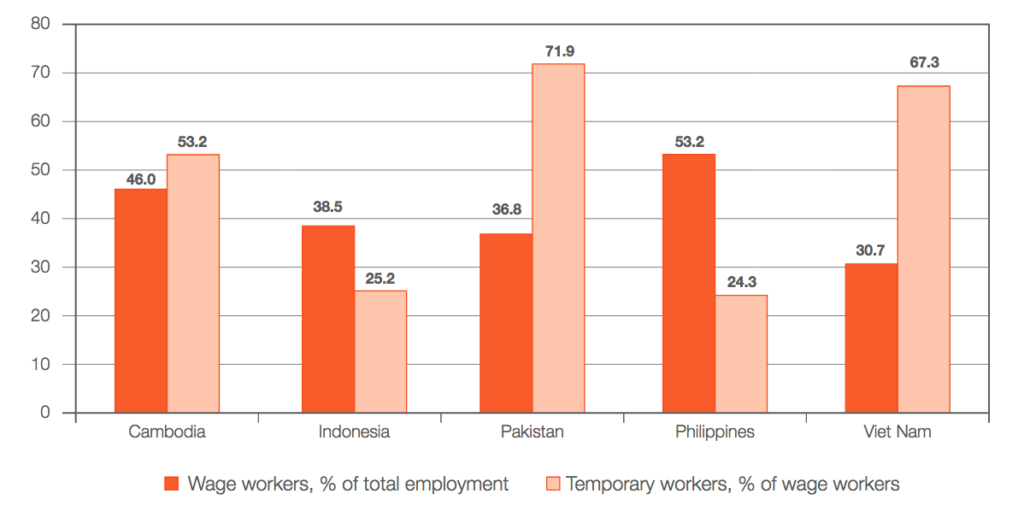
The violations of labor rights are happening in the context of a deteriorating human rights crisis in the Philippines where we have seen direct attacks against workers. As labor leader Josua Mata, Secretary General of the progressive labor center SENTRO elucidated in a recent interview, “ (S)ince 2017, the Philippines has been among the top ten worst countries in the world for workers according to the International Trade Union Confederation’s Global Rights Index, and rightly so. Duterte’s bloody war on drugs created a climate of impunity, leading to the killing of more than 50 trade union leaders since 2016. Only one of these murders went to the courts and is still under litigation. Many more cases of trade union killings and what we call ‘extrajudicial killings’ remain to be investigated.” [17]
Impact on Women
“While both women and men are equally affected by contractualization, women suffer greater consequences” according to the Women’s Committee of Nagkaisa Labor Coalition. In a statement issued on Duterte’s first year in office, the women workers raised the concern over the gender bias underpinning the practice of contractualization. An example of this gender bias is the non-regularization of nursing working mothers who are penalized for demanding 40-minute lactation breaks to express their milk at lactation stations in the workplace, for every eight hours of work. [18]
They point out that particular problems faced by women are “deeply rooted in structural inequities and historical gender-based inequality such as in the areas of the wide gender pay gap and equal opportunity for promotion.” [19]
Post Election Prospects
The 2022 elections became an arena for workers to amplify their demands against contractualization. While a stronger security of tenure law remains central to the anti-contractualization campaign, the labor sector needs to situate its advocacy efforts and confront as well a changed policy environment that is driven by post-pandemic economic recovery policies that could exacerbate the problem of job insecurity.
Liberalization policies
The impending concurrence of the Regional Comprehensive Economic Partnership Agreement (RCEP), and the possible push for more free trade and investment agreements will be major challenges for workers. RCEP for example is expected to negatively impact outputs in some agriculture,fisheries and manufacturing sectors. A forthcoming report from Labor Education and Research Network (LEARN) showed slight declines in outputs in manufacture of rubber and plastic products, motor vehicles and parts, and transport equipment nec. These output declines could result in job losses in these sectors. [20]
Towards the end of its term, the Duterte administration succeeded in pushing three major policy reforms all directed towards opening the economy to the entry of foreign capital as a driver of post pandemic recovery. Passed in succession were the Retail Trade Liberalization Act, the amended foreign investments act, and the amendments to the public services act. Proponents project a surge in foreign direct investments [21] into the country as well as the creation of millions of new jobs [22] a result of these policy amendments. While these policy reforms remove barriers, in some cases circumventing even those limitations prescribed in the Philippine Constitution, to entry of foreign capital, they also signal a policy preference towards among other things deregulation of labor markets, greater labor market flexibilities [23] and would further incentivize the practice of contractualization.
Another factor pushing contractualization is the fact that labor contracting has become a highly profitable business. According to Josua Mata of SENTRO, “contracting is now a multi-billion peso business. Its model is based on charging employers a premium above the minimum wage, which then gives the employers the ability to hide employee-employer relations, thereby preventing workers from organizing a union in their company.” [24]
Attacks against workers
Another major challenge for the labor sector is the continuing threats against labor leaders resulting from vilification and red tagging, assault on labor rights, shrinking democratic space, and extra judicial killings. The Kilusang Mayo Uno (KMU) reported in 2019 that around 43 unionists have been killed since the beginning of the Duterte administration. [25]
The report of the Council of Global Unions-Pilipinas to the ILO’s Committee on the Application of Standards (CAS) pointed out how the inaction by the Philippine Government encouraged the intensification of attacks, red-tagging, intimidation, and harassment of trade unionists.” The report added that from 2019 to 2021, the Philippine affiliates of Council of Global Unions have documented seven (7) killings of trade unionists, sixteen (16) cases of arrests and detention, twelve (12) cases of forced disaffiliation, state interference with the right to self-organization, through threats, harassment and intimidation, seventeen (17) cases of red-tagging/terrorist- tagging/intimidation/ harassment and two (2) cases of other anti-union activities. [26]
Contractualization and the 2022 elections
Contractualization was a prominent issue discussed during the 2022 election campaign, with all the major presidential candidates expressing their position on the matter. All of them vowed to end contractualization, repeating the Duterte promise in 2016. All have committed to prioritize the passage of a new security of tenure law.
Marcos, who has a huge lead in the polls and poised to secure a landslide victory, despite growing concerns over irregularities in the vote counting, had said he would talk to owners of big corporations, some of whom, he said, are his “friends,” to address the problem of contractualization. [27]
Marcos’ position on contractualization echoes that of Duterte taking the view that there are some jobs that are seasonal and that do not exist all year, like agriculture for example. [28] But apart from very few policy pronouncements like these addressed to the labor federation that endorsed him, Marcos has not presented a clear program of government much less his views on the issues confronting workers. He refused to participate in the televised debates and forums, except for the one organized by a network that endorsed him, preferring to do select interviews instead as a means to communicate his campaign message of unity to the public.
No Clear Labor vote
The elections however have also exposed divisions within the labor movement with various labor unions and confederations going separate ways, endorsing different candidates. The Trade Union Congress of the Philippines (TUCP) , the biggest labor confederation, endorsed the tandem of Marcos,Jr and his vice presidential running mate Sara Duterte, the daughter of the outgoing President.
In an interview on ANC, Louie Corral, TUCP Vice President said they put forward 8 executive and 8 legislative measures to Marcos as part of their labor agenda. These include the demand for 4 million jobs, transforming the country into a crew change hub, covid related demands like paid 15-day isolation and quarantine leave, free testing for workers, hazard pay and risk allowance for healthcare workers, and relief assistance in times of new surges. They are also demanding livelihood assistance for displaced workers, and for the government to reduce electricity costs. [29]
He emphasized in the interview a few broad points of this agenda. First is a guaranteed seat at the table for workers. While he did not elaborate, you can interpret this as TUCP having the ear of Marcos on matters of workers’ concerns. Second, is giving priority to the protection of workers; and third, a commitment to review the issue of security of tenure and to either come up with new law through Congress or through executive action. [30]
On the opposition side, there was some level of broad unity under the formation called the All Labor Leaders for Leni (ALL 4 Leni) [31] and KMU, which backed the candidacy of Vice President Leni Robredo and her running mate Senator Kiko Pangilinan. Bukluran ng Manggagawang Pilipino (BMP) on the other hand endorsed and spearheaded the campaign of labor leader Leody de Guzman and Walden Bello.
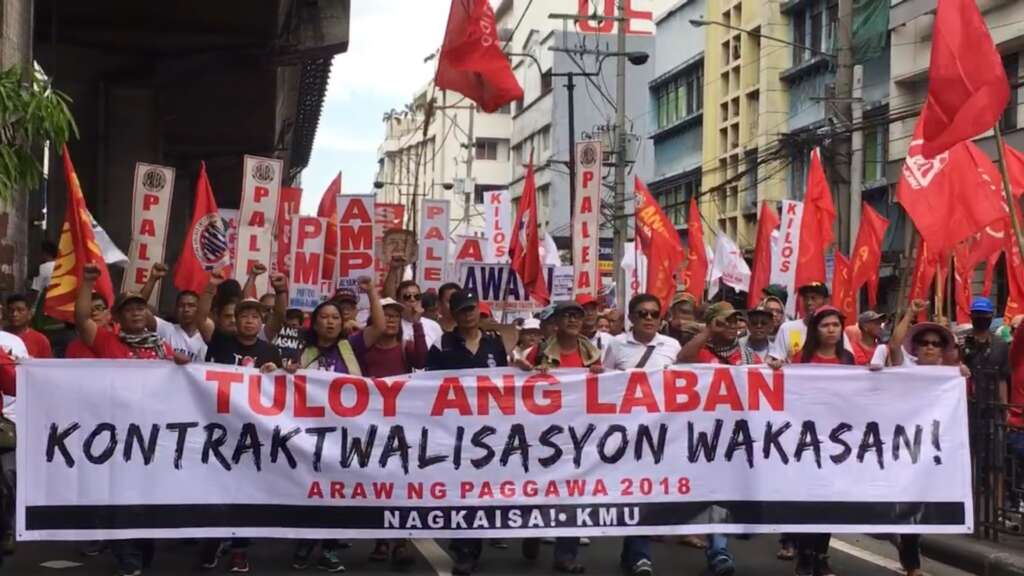
Workers unite against contractualization. Workers representing various trade unions marching side by side on Labor Day. Manila, Philippines.1 May 2018. Photo by Joseph Purugganan
The Road Ahead
As the 2022 election campaign comes to an end and the country transitions to a new administration, the continuing struggle for more secure and decent work, for living wages, for democratic space to exercise their rights, and the fight to end contractualization must continue albeit under what is anticipated to be a more challenging context. How organized labor will consolidate after the elections, like it did previously on the issue of contractualization and Labor Win electoral campaign in 2019, is a crucial question that the sector must confront and address as it traverses a much more precarious and potentially more perilous road ahead.#
—–
[1][Daniza Fernandez, INQUIRER] Duterte hails workers on Labor Day, assures sustained gov’t support, https://newsinfo.inquirer.net/1590567/govt-to-remain-committed-to-providing-opportunities-for-workers
[2] [Philippine Statistics Authority, Labstat Updates] 2014 SURVEY OF EMPLOYMENT in establishments with 20 or more workers: STATISTICS ON NON-REGULAR WORKERS, https://psa.gov.ph/sites/default/files/Vol20_10%20Statistics%20on%20Non-Regular%20Workers%20%28Second%20of%20a%20%20series%29__FINAL2.pdf
[3] [Maria Catalina M. Tolentino, The Japan Institute for Labour Policy and Training] Philippine Report on Employment Trends and Policies: Can the Duterte Administration End Contractualization?, https://www.jil.go.jp/english/jli/documents/2017/003-06.pdf
[4] [Senate of the Philippines] The MSME Sector At A Glance, https://legacy.senate.gov.ph/publications/AG%202012-03%20-%20MSME.pdf
[5] [Sofia Tomacruz, Rappler] TIMELINE: Duterte’s promise to abolish endo, https://www.rappler.com/newsbreak/iq/201468-duterte-endo-contractualization-promise-2016-to-2018
[6] [Delfin T. Mallari Jr., INQUIRER] Duterte admits his executive order on ‘endo’ has no bite, https://newsinfo.inquirer.net/987545/duterte-admits-his-executive-order-on-endo-has-no-bite
[7] Ibid.
[8] [Daniza Fernandez, INQUIRER] Duterte hopes Congress will rectify vetoed provisions of security of tenure bill, https://newsinfo.inquirer.net/1579659/fwd-duterte-hopes-congress-would-rectify-vetoed-provisions-of-security-of-tenure-bill
[9] [Christina Mendez, Philstar] Duterte vetoes ‘endo’ bill, https://www.philstar.com/headlines/2019/07/27/1938275/duterte-vetoes-endo-bill
[10] [Pia Ranada, Rappler] Duterte vetoes ‘endo’ bill, https://www.rappler.com/nation/236333-duterte-vetoes-anti-endo-bill
[11] [Federation of Filipino-Chinese Chambers of Commerce and Industry] DOLE releases list of top 20 companies engaged in labor only contracting companies, https://www.ffcccii.org/dole-releases-list-of-top-20-companies-engaged-in-labor-only-contracting-content
[12] [Ralf Rivas, Rappler] Like workers, business groups don’t like anti-endo bill under Duterte, https://www.rappler.com/business/235682-workers-business-groups-do-not-like-anti-endo-bill-under-duterte
[13] [Fact Checks, Rappler] FALSE: Labor contractualization did not exist during Marcos era, https://www.rappler.com/newsbreak/fact-check/labor-contractualization-did-not-exist-ferdinand-marcos-era-administration
[14] [ILO] Non-Standard Employment Around the World: Understanding challenges, shaping prospects, https://www.ilo.org/wcmsp5/groups/public/@dgreports/@dcomm/@publ/documents/publication/wcms_534326~2.pdf
[15] Ibid.
[16] Ibid.
[17] [Josua Mata, Liliane Danso-Dahmen, Rosa Luxemburg Stiftung] Social Democracy or “Dutertismo”?, https://www.rosalux.de/en/news/id/46495/social-democracy-or-dutertismo?fbclid=IwAR3W9Oc14f3fydgyFW1pKq0xzeYfAn7UOVepEqqx8AGzzDiMJ91KXcasXO8
[18] [Partido Manggawa] Women call for end to endo, contractualization on Women’s month, http://partidongmanggagawa2001.blogspot.com/2017/03/women-call-for-end-to-endo.html
[19] Ibid.
[20] Castillo, CJ. Presentation on Preliminary Results of Study on Output and Employment impact of RCEP. Labor Education and Research Network (LEARN). Publication forthcoming. 2021
[21] [Arjay L. Balinbin, Business World] FDI surge expected as full foreign ownership allowed in more sectors, https://www.bworldonline.com/top-stories/2022/02/04/427627/fdi-surge-expected-as-full-foreign-ownership-allowed-in-more-sectors
[22] [Charles Chau, HRM Asia] Foreign investments to create 3 million new jobs in the Philippines, https://hrmasia.com/foreign-investments-to-create-3-million-new-jobs-in-the-philippines
[23] [Choi Hyelin, KIEP] Labor Market Flexibility and FDI: Evidence from OECD Countries, https://www.think-asia.org/bitstream/handle/11540/9182/WP16-06.pdf?sequence=1
[24] Comments shared with the author. 13 May 2022.
[25] [UE Union] Take Action Against Violent Repression of Trade Unions in the Philippines, https://www.ueunion.org/political-action/2019/take-action-against-violent-repression-of-trade-unions-in-the-philippines
[26] Council of Global Unions-Pilipinas. Report on the continued violation of trade union rights, particularly ILO Convention 87 in the Philippines. 6 September 2021.
[27] [Nestor Corrales, INQUIRER] Bongbong Marcos vows to end ‘endo’ too, https://newsinfo.inquirer.net/1558980/marcos-vows-to-end-endo-too#ixzz7STfytUxK
[28] [Philstar] Marcos on ‘endo’: The reality is some jobs are seasonal, https://www.philstar.com/headlines/2022/03/21/2168869/marcos-endo-reality-some-jobs-are-seasonal
[29] Report of Zen Hernandez, TV Patrol. ABS-CBN. 13 May 2022. https://www.facebook.com/watch/?v=1410904596001724
[30] ABS-CBN News Channel (ANC) Interview with Louie Corral of TUCP. Aired May 9, 2022
[31] Alliance of Labor Leaders for Leni (ALL 4 Leni) comprised of the following trade unions and labor centers SENTRO, Federation of Free Workers, National Congress of Unions in the Sugar Industry NACUSIP, National Federation of Labor, (NFL), National Union of Bank Employees (NUBE), United Filipino Service Workers (UFSW), and Partido Manggagawa (PM)


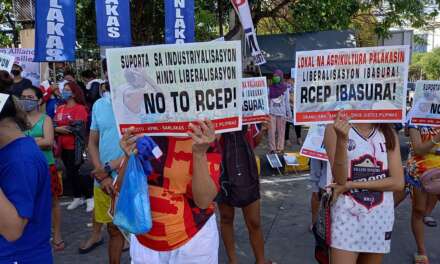
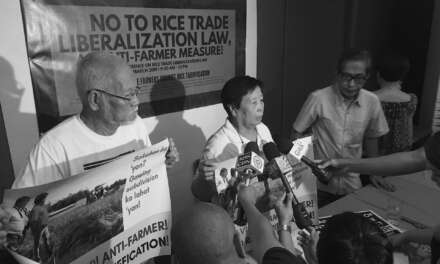

![[IN PHOTOS] In Defense of Human Rights and Dignity Movement (iDEFEND) Mobilization on the fourth State of the Nation Address (SONA) of Ferdinand Marcos, Jr.](https://focusweb.org/wp-content/uploads/2025/07/1-150x150.jpg)



